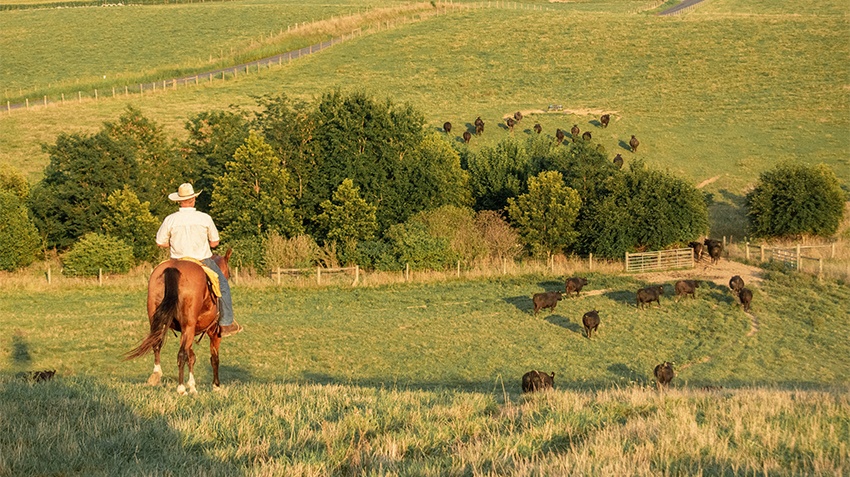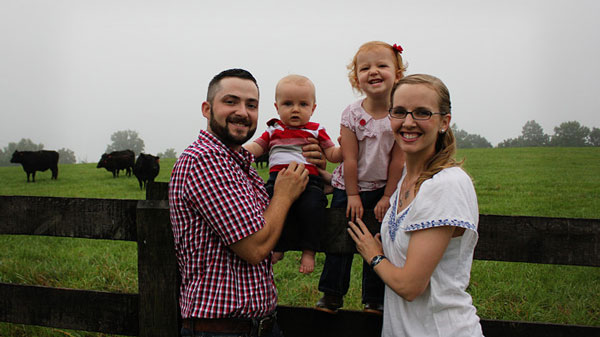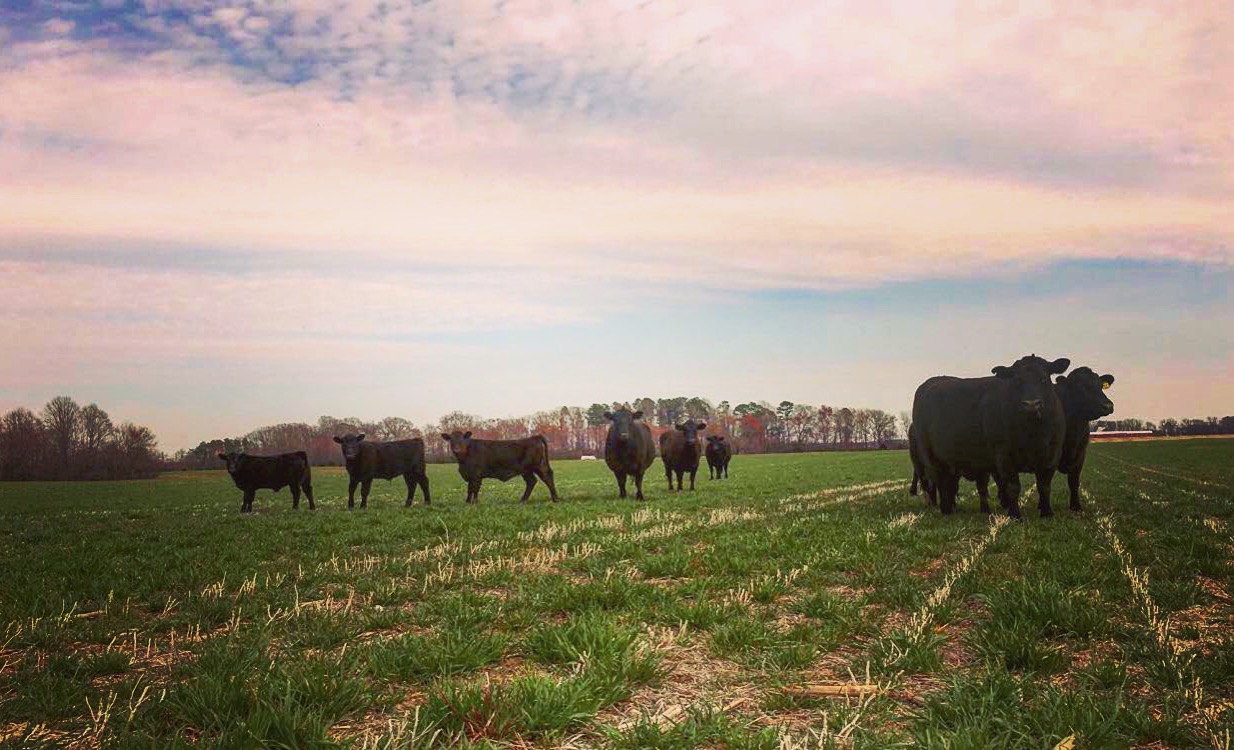Audley Farms
Matthew Deacon has been working for Audley Farms for just over three years. Matthew came to the operation after completing his master’s degree in reproductive physiology from West Virginia University. Audley Farms has about 3000 acres, all on one track of land, which is unique for this area. Here they raise 300 mamma cows and are continuing their growth as a Seedstock operation. Audley Farms has an extensive freezer beef program for their local community market and a few restaurants in the Winchester and Berryville area.
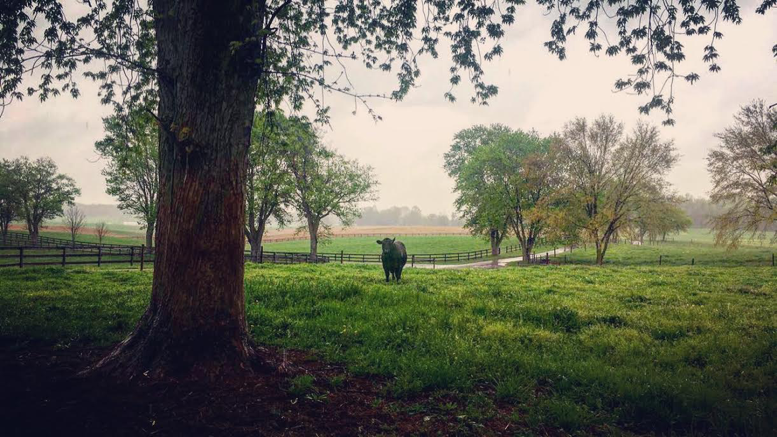
Background Information from MacKenzie Moore, past intern with Virginia Cattlemen Association
Audley Farms is very historical. The house next door to the main office was owned by Nelly Custis, which was the adopted daughter of George Washington. Nelly actually passed away on this very farm. The house was built in 1794 and the tract of land was purchased int he 1750's. The land has only changed hands four times since this time. There are multiple slave quarters from this era on the farm, as well as a mounting block that George Washington himself used to mount his horse.
Matthew Deacon has been working for Audley Farms for just over three years. He came to the operation after completing his master's program in reproductive physiology from West Virginia University. He has been involved in the cattle industry since he was younger, and showed through 4-H while helping his family with their small herd of cattle.
The farm's primary focus is the Seedstock sector of the industry, where they sell bulls through a cooperation in Cameron, Texas along with 44 other farms. They recently began selling female cattle locally. They are still building their herd; the cattle portion of the farm has only been in operation since the early 2000's.
VBC: Matt, tell us a little about the herd here. What do the cattle eat, and where is this feed sourced?
Matt: We run primarily on a forage program. All of the cattle graze through the summer and are supplemented with hay during the winter with hay that we make here on the farm. The cattle that we feed out for direct-marketing we use local feed stores to purchase grain and commodity blended feed. This is done to add some fat to the animal during the last 30 days or so, which leads to more marbling in the meat. Replacement heifers [heifers that will be kept in the herd for genetics] are also fed some grain.
VBC: It sounds like you have a lot of specific protocols on the farm. How would you say that you participate and play a role in producing high-quality beef?
Matt: We use cutting edge genetics. We have spent a lot of time focusing on the end product of our cattle. We are sort of the beginning of the chain, and we pay close attention to carcass weight and marbling of the meat, and follow the cattle through the feedlot sector. We buy bulls and females, or choose AI [Artificially inseminated] genetics based on what is going to produce a good beef product. It has been a neat experience to see where the freezer beef program has taken us...We get regular feedback from our customers on the quality of our beef.
VBC: Aside from running a seedstock operation, which is the beginning of the beef lifecycle, and raising some cattle all the way through the lifecycle to sell beef directly, what is something else that you feel is unique about your operation?
Matt: As a whole, the operation is unique in many aspects. Not many people can say that George Washington and Robert E. Lee spent time on their property. The history is unique, as is our size. It's not common to have one plot of land of 3,000 acres anywhere in Virginia.
VBC: That's a lot of great Virginia history! With a farm that big, how would you define a successful operation?
Matt: Success for us is the quality of the product we offer, and the customer feedback (whether the customer is buying bulls or steaks).
VBC: What is a typical day like on your operation?
Matt: There is no typical day. There are many days when I have things planned, but when I get to the office and start helping others, there isn't time to do what I had planned. It's all about adjusting.
VBC: How is technology used at Audley Farms?
Matt: Most of the technology we use is in reproduction. We use artificial insemination, embryo transfer, and in-vitro fertilization, just like human medicine does. We also have newer and more modern equipment for the crop and forage portion of our operations. We use a hydraulic chute for working cattle, which helps us easily catch and calmly restrain animals for things like vaccinations.
VBC: It sounds like technology helps a lot on the farm. What would you say is the biggest challenge you've faced being part of the beef community?
Matt: Educating the general public. There are so many misconceptions. Media can be your best friend, or your worst enemy. New trending niche markets and inaccurate marketing claims and phrases make it difficult to teach consumers the facts.
VBC: What would you say has been the biggest opportunity?
Matt: Getting to live my dream. Growing up we had a small operation with sheep and cattle. It was one of those situations where you knew you were not going to get to come back to the family farm because it wasn't big enough to be sustainable. I went to school wanting to be a vet, but I ended up learning I wanted to be a farmer instead. The beef industry has given me that opportunity. It takes a humble person to do this job. In this modern age, there are so many people who take for granted the aspects of their jobs. In this job, we are not looking for a pat on the back; this is the lifestyle we have chosen.
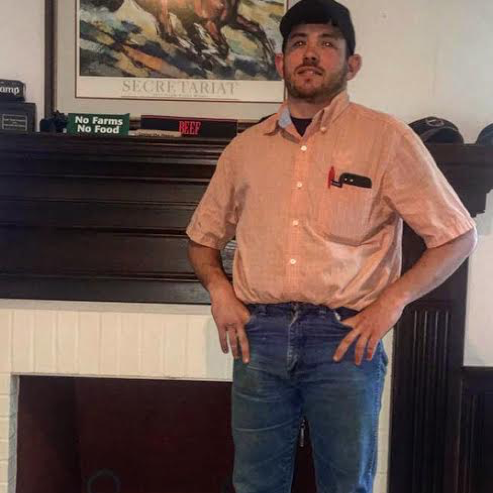 Matthew Deacon, one of the Angus managers at Audley Farms
Matthew Deacon, one of the Angus managers at Audley Farms
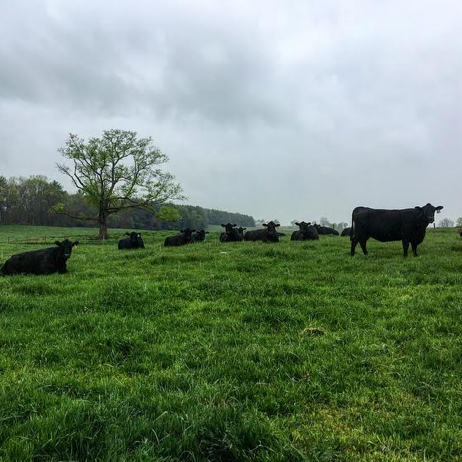
Cattle at Audley Farms in Berryville, Virginia
